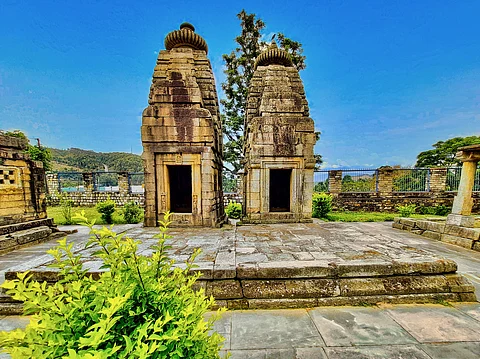
- Destinations
- Experiences
- Stay
- What's new
- Celebrating People
- Responsible Tourism
- CampaignsCampaigns
- SubscribeSubscribe
- Buy Now

Maniyan Temple Complex | The tranquil town of Dwarahat in the Almora district of Uttarakhand is known for its cultural heritage and historical significance, largely thanks to the Katyuri dynasty that ruled the Kumaon region from the 7th to the 12th centuries.
While the Dunagiri temple is easily one of Dwarahat’s most impressive shrines, the Maniyan temple complex is a less well-known site that deserves visitors’ consideration. Dedicated to the Hindu deity Durga, this ancient temple group offers a captivating glimpse into the architectural prowess and artistic sensibilities of bygone eras.
There are 55 ancient Hindu temples in Dwarahat that showcase Indo-Aryan, Maru-Pratihara and Nagara styles of architecture. Divided into eight groups, these ancient temples hold immense archaeological value and are protected sites.
Among these is the Maniyan Group of Temples, which has nine shrines, some dedicated to Jain Tirthankaras and some to Brahminical deities. Four of the shrines are built in a square, with each having the exact same front courtyard. Archaeologists believe the Maniyan Group of Temples was built between the 11th and 13th centuries.
The central shrine of the Maniyan temple complex is dedicated to Durga and is the most prominent structure. Built in the Nagara style of architecture, it features a shikhara (tower) that tapers towards the top, adorned with intricate carvings depicting mythological scenes and floral motifs. The sanctum sanctorum houses a beautifully crafted idol of the deity depicted in her eight-armed form and mounted on a lion.
Surrounding the central shrine are several smaller temples dedicated to other Hindu deities like Shiva, Vishnu, Ganesha and Surya. Each temple boasts its own unique architectural style and artistic elements. The intricate carvings on the doorways, pillars and walls showcase the exceptional craftsmanship of the bygone era.
The complex also houses several ornately carved stone mandapas (pavilions), which were likely used for religious gatherings and ceremonies. The serene atmosphere of the temple complex, accentuated by the surrounding hills and lush greenery, provides a perfect setting for prayer, meditation, and spiritual contemplation.
The intricate carvings and architectural style of the temples bear resemblance to the Katyuri-era architecture seen in other prominent temples of the region, like the Baijnath temple of Kangra district in Himachal Pradesh and the Katarmal Sun Temple of Almora.
The Maniyan temple complex holds immense significance in the cultural and religious life of the Kumaon region. It is considered a sacred pilgrimage site, attracting devotees from far and wide. During festivals like Durga Puja and Navratri, the temple comes alive with vibrant celebrations. Devotees offer prayers to Durga to seek her blessings for strength, protection and prosperity.
The temple complex also plays a vital role in preserving the region’s rich artistic heritage. Today, the temple complex is protected by the Archaeological Survey of India (ASI), ensuring its preservation for future generations.
The best time to visit Dwarahat is from March to June and September to November, when the weather is pleasant and ideal for outdoor activities. During these months, the comfortable temperatures make it a great time to explore the area's natural beauty and ancient temples.
The nearest railway station is Kathgodam (109 km), while the closest airport is Pantnagar (143 km). You can hire a taxi from either of these places to reach Dwarahat. The town is also well-connected with various cities in Uttarakhand, such as Almora and Ranikhet.
